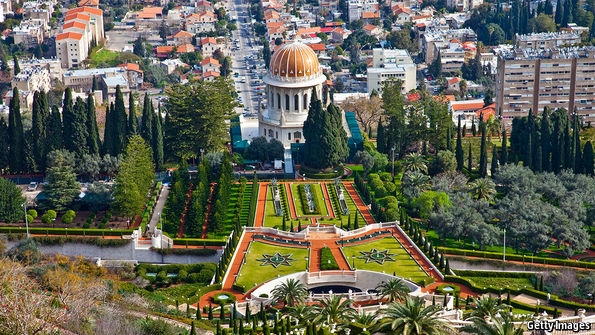Source: www.economist.com
by
THE Israeli city of Haifa is having a busy few days. On April 16th, in the twisting alleys around the harbour, Christians celebrated Easter. The previous day, local Jews had worshipped in their synagogues on their Passover sabbath. And from April 20th, a small community of Bahais will begin Ridvan, their most important festival. The Bahai in Haifa are not alone. Although the religion is based there, it boasts millions of followers around the world. Who are the Bahai?
Their faith is comparatively new. In 1844 a merchant who called himself “the Bab” (“the Gate”) began preaching in Persia. He reinterpreted Shia Islam, and said that God would soon send a new prophet in the manner of Moses, Christ and Muhammad. Bahais consider one of the followers of the Bab—Baha’u’llah—to be this prophet, and the official founder of their religion. In the face of persecution by the Persian and Ottoman empires, Baha’u’llah wrote the community’s key text. He also picked the site of the Bab’s burial: a handsome spot in Haifa, overlooking the Mediterranean.
As its origins suggest, the Bahai faith borrows happily from other religions. Like Islam, it prohibits alcohol. And just as Muslims worship in the direction of Mecca, the Bahai pray towards the house near Haifa where Baha’u’llah is buried (pictured). Other religions—including Hinduism and Buddhism—are honoured too. Its Persian heritage is evident. Bahais celebrate the Iranian New Year, and admire Zoroastrianism. The Bahai believe in a “oneness of humanity”, which transcends racial and class divides. This has helped the religion spread among vulnerable groups like native Americans. On the other side of the Pacific, the Bahai faith is popular among Papuan tribes: Bahais are more comfortable with their continuing traditional customs than are some Christian missionaries. Good organisation also helps. “Pioneers” preach the religion abroad, while its leaders support education for women. There are now more than 7m Bahais around the world, from Bolivia to Chad.
But if flexibility has helped spread the faith, it has also caused problems. Many Islamic scholars regard the Bahai as apostates; their first believers had been Muslims, who reject all prophets after Muhammad. Other critics also accuse Bahais of subversion, and link its base in Haifa to Zionism. As a result, the Bahai have been persecuted around the Muslim world, especially in Iran. Hundreds of Iranian Bahais have been arrested in recent years and last September a Bahai man was murdered in the city of Yazd. Bahais have also been imprisoned in Yemen. Pressure from Bahai groups abroad has helped slightly. Egyptian Bahais no longer need to choose between “Muslim”, “Christian” or “Jewish” on their identity cards, for instance. A special school has been set up to teach Bahais who have been banned from university. But the Bahai continue to suffer in some parts of the Middle East—even as the religion thrives elsewhere.

Leave a Reply